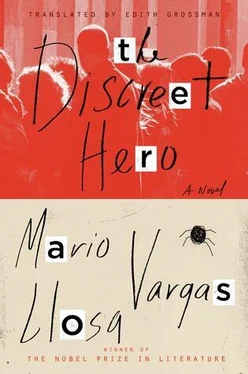Gertrudis had been hardworking and self-sacrificing during the difficult years. And afterward too, when Felícito had opened Narihualá Transport and things got better. Even though they had a nice house, a servant, and dependable income, she still lived with the austerity of the years when they were poor. She never asked for money for anything personal, only food and other daily expenses. From time to time he had to insist that she buy herself shoes or a new dress. But even though she did, she always wore flip-flops and a robe that looked like a cassock. When had she become so religious? She wasn’t like that in the beginning. It seemed to him that over the years Gertrudis had turned into a piece of furniture, that she’d stopped being a living person. They spent entire days not exchanging a word except for good morning and good night. His wife had no women friends, she didn’t pay visits or receive them, she didn’t even go to see her children when they let days go by without coming to see her. Tiburcio and Miguel dropped by the house occasionally, always for birthdays and Christmas, and whenever they did she was affectionate with them, but except for these occasions, she didn’t seem to have much interest in her sons either. Once in a while Felícito suggested going to the movies, taking a walk along the seawall, or listening to the Sunday band concert on the Plaza de Armas after noon Mass. She agreed docilely, but these were excursions during which they barely said a word, and Gertrudis seemed impatient to get back to the house, to sit in her rocking chair at the edge of the small courtyard, beside the radio or the television, inevitably tuning in to religious programs. As far as Felícito could recall, he’d never had an argument or a disagreement with this woman who always yielded to his will with total submission.
He stayed in the living room for a while, listening to the news. Crimes, muggings, kidnappings, the usual. One of the news items made his hair stand on end. The announcer said that a new method for stealing cars was becoming popular with thieves in Lima. They took advantage of a red light to throw a live rat inside a car driven by a woman. Overcome by fear and revulsion, she’d let go of the wheel and bolt out of the vehicle, screaming. Then the thieves would take it, very calmly. A live rat on their skirts, how indecent! Television poisoned people with so much blood and filth. Usually, instead of the news, he’d put on a Cecilia Barraza record. But now he anxiously followed the commentary of this newscaster on 24 Horas , who stated that crime was on the rise all over the country. “You’re telling me,” he thought.
He went to bed at about eleven, and even though he fell asleep immediately, no doubt because of the intense emotions of the day, he woke at two in the morning. He could barely close his eyes again. He was assaulted by fears, a sensation of catastrophe, and, most of all, the bitterness of feeling useless and impotent in the face of what was happening to him. When he did doze off, his head seethed with images of diseases, accidents, and misfortunes. He had a nightmare about spiders.
He got up at six. Next to his bed, watching himself in the mirror, he did qigong exercises, thinking, as usual, about his teacher, the storekeeper Lau. The posture of the tree that sways forward and back, from left to right and around, moved by the wind. With his feet planted firmly on the floor, trying to empty his mind, he swayed, looking for his center. Looking for his center. Not losing his center. Raising his arms and lowering them very slowly, a very light drizzle that fell from the sky, refreshing his body and his soul, calming his nerves and his muscles. Keeping the sky and the earth in their place and not allowing them to join, with his arms — one raised, stopping the sky, the other lowered, holding down the earth — and then, massaging his arms, his face, his kidneys, his legs to get rid of the tensions stagnating everywhere in his body. Parting the waters with his hands and bringing them together again. Warming the lumbar region with gentle, slow massage. Opening his arms the way a butterfly spreads its wings. At first the extraordinary slowness of the movements, the slow-motion breathing that was meant to keep the air passing to every corner of the organism, made him impatient, but over the years he’d grown accustomed to it. Now he understood that in this slowness lay the benefit brought to his body and spirit by the delicate, deep inhalation and exhalation, the movements with which, by raising one hand and extending the other against the ground, his knees slightly bent, he kept the stars in place in the firmament and averted the apocalypse. When, at the end, he closed his eyes and remained motionless for a few minutes, his hands clasped as if in prayer, half an hour had gone by. Now the clear, white light of a Piuran dawn was coming through the windows.
Some loud knocks at the street door interrupted his qigong. He went to open it, thinking that this morning Saturnina was early, because she never came before seven. But when he opened the door, the person he found on the threshold was Lucindo.
“Run, run, Don Felícito.” The blind man from the corner was very agitated. “A gentleman told me your office on Avenida Sánchez Cerro is on fire and you should call the fire department and get over there fast.”
The wedding of Ismael and Armida was the shortest, most sparsely attended that Rigoberto and Lucrecia could remember, even though it provided them with quite a few surprises. It took place very early in the morning, in the town hall of Chorrillos, when the streets were still filled with pupils in uniform heading for school and office workers from Barranco, Miraflores, and Chorrillos hurrying to work in jitneys, cars, and buses. Ismael, who’d taken the expected precautions to keep his sons from finding out ahead of time, let Rigoberto know only the night before that at nine sharp he should appear at the office of the mayor of Chorrillos, accompanied by his wife if he so desired, and be sure to bring his identity documents. When they reached the town hall, the bride and groom were there with Narciso, who had on a dark suit, white shirt, and blue tie with little gold stars for the occasion.
Ismael was dressed in gray, with his usual elegance, and Armida wore a tailored suit, new shoes, and was visibly constrained and confused. She called Doña Lucrecia “señora” even after Lucrecia had embraced the bride and asked her to use informal address. “Now you and I are going to be good friends, Armida.” But for the ex-maid it was difficult, if not impossible, to comply.
The ceremony was very quick; the mayor stumbled through the obligations and duties of the contracting parties, and as soon as he finished reading, the witnesses signed the register. There were the obligatory embraces and handshakes. But it all seemed cold, thought Rigoberto, false and artificial. The surprise came when Ismael turned to Rigoberto and Lucrecia with a sly little smile as they were leaving the office: “And now, my friends, if you’re free, I’ll invite you to the religious ceremony.” They were going to be married in a church as well! “This is more serious than it seems,” Lucrecia remarked as they went to the old Church of Nuestra Señora del Carmen de la Legua on the outskirts of Callao, where the Catholic wedding took place.
“The only explanation is that your friend Ismael is moonstruck and has really fallen in love,” Lucrecia added. “Do you think he’s senile? He really doesn’t look it. My God, who can make heads or tails of all this? I certainly can’t.”
Everything was prepared in the church where, in colonial times, they say travelers from Callao to Lima always stopped to pray to the Blessed Virgin del Carmen for protection from the gangs of thieves who swarmed over the open countryside, which in those days separated the port from the capital of the viceroyalty. The priest took no more than twenty minutes to marry the couple and give his blessing to the newlyweds. There was no celebration at all, not even a toast, except, once more, congratulations and hugs from Narciso, Rigoberto, and Lucrecia. Only at that moment did Ismael reveal that he and Armida were leaving for the airport to begin their honeymoon. Their luggage was already in the trunk of the car. “But don’t ask me where we’re going, because I won’t tell you. Ah, and before I forget. Be sure to read the society page in tomorrow’s El Comercio . You’ll see the notice informing Limeñan society of our wedding.” He guffawed and gave a mischievous wink. He and Armida left immediately, driven by Narciso, who’d gone from being a witness to resuming his position as Don Ismael Carrera’s driver.
Читать дальше

![Гарри Гаррисон - Bill, the Galactic Hero [= The Starsloggers]](/books/87536/garri-garrison-bill-the-galactic-hero-the-star-thumb.webp)










